This is the first book to provide an account of the influence of Proclus, a member of the Athenian Neoplatonic School, during more than one thousand years of European history (c.500-1600). Proclus was the most important philosopher of late antiquity, a dominant (albeit controversial) voice in Byzantine thought, the second most influential Greek philosopher in the later western Middle Ages (after Aristotle), and a major figure (together with Plotinus) in the revival of Greek philosophy in the Renaissance. Proclus was also intensively studied in the Islamic world of the Middle Ages and was a major influence on the thought of medieval Georgia. The volume begins with a substantial essay by the editor summarizing the entire history of Proclus' reception. This is followed by the essays of more than a dozen of the world's leading authorities in the various specific areas covered.

